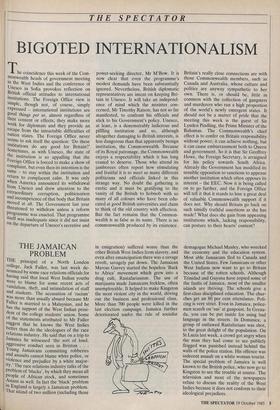THE JAMAICAN PROBLEM
THE principal of a North London college, Jack Fuller, was last week de- nounced by some race relations officials for having said that local West Indian youths were to blame for some recent acts of vandalism, theft, and intimidation of staff and students. The accusation of 'racism' was more than usually absurd because Mr Fuller is married to a Malaysian, and he has the support of the West Indian presi- dent of the college students' union. Some of the statements attributed to Mr Fuller suggest that he knows the West Indies better than do the ideologues of the race relations industry. He said that on a trip to Jamaica he witnessed 'the sort of loud, aggressive conduct seen in Brixton . Young Jamaicans committing robberies and assaults cannot blame white police, or violence and prejudice by a white major- ity.' The race relations industry talks of the problem of 'blacks', by which they mean all People of African stock, and sometimes Asians as well. In fact the 'black' problem in England is largely a Jamaican problem. That island of two million (including those in emigration) suffered worse than the other British West Indies from slavery, and even after emancipation there was a savage revolt, savagely put down. The Jamaican Marcus Garvey started the hopeless 'Back to Africa' movement which grew into a drug cult, Rastafarianism. The use of marijuana made Jamaicans feckless, often unemployable. It helped to make Kingston the most violent city in the world, driving out the business and professional class. More than 700 people were killed in the last election campaign. Jamaica further deteriorated under the rule of socialist demagogue Michael Manley, who wrecked the economy and the education system. Most able Jamaicans fled to Canada and the United States. Few Jamaicans or other West Indians now want to go to Britain because of the rotten schools. Although Trinidad and Guyana have copied some of the faults of Jamaica, most of the smaller islands are thriving. The schools give a first-class disciplined education. The chur- ches get an 80 per cent attendance. Poli- cing is very strict. Even in Jamaica, police- men search on 'sus' at gunpoint. In Grena- da, you can be put inside for using bad language in the streets. In Dominica, a group of outlawed Rastafarians was shot, to the great delight of the population. On St Lucia last week, a crowd got angry when the man they had come to see publicly flogged was punished instead behind the walls of the police station. His offence was indecent assault on a white woman tourist. The special problem of Jamaica is well known to the British police, who now go to Kingston to see the trouble at source. The television and most of the newspapers refuse to discuss the reality of the West Indies because it does not conform to their ideological prejudices.


















































 Previous page
Previous page